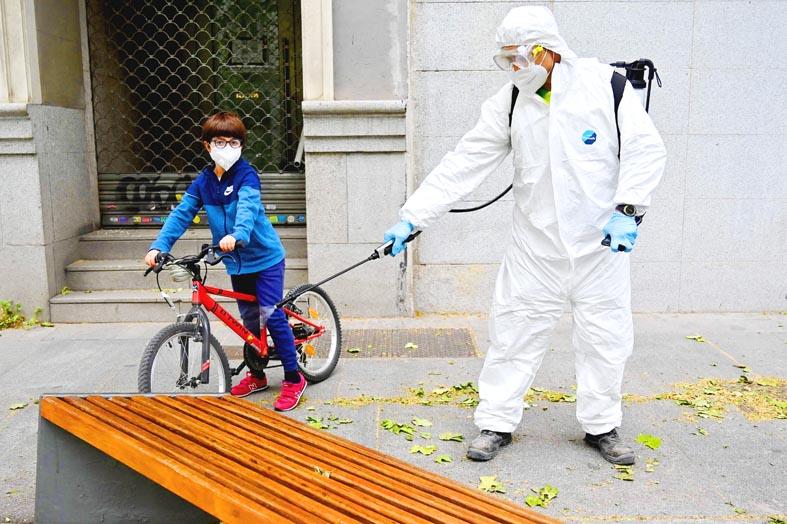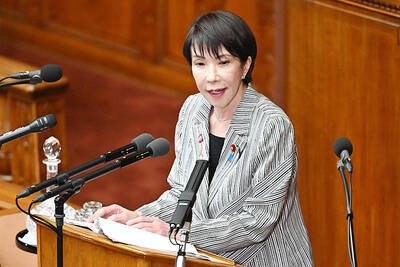Doctors in Britain, Italy and Spain have been warned to look out for a rare inflammatory condition in children that is possibly linked to the new coronavirus.
Earlier this week, Britain’s Paediatric Intensive Care Society issued an alert to doctors that in the past three weeks, there has been an increase in the number of children with “a multisystem inflammatory state requiring intensive care” across the country.
The group said there was “growing concern” that either a COVID-19 related syndrome was emerging in children or that a different, unidentified disease might be responsible.

Photo: AFP
“We already know that a very small number of children can become severely ill with COVID-19, but this is very rare,” Royal College of Paediatrics and Child Health president Russell Viner said.
“New diseases may present in ways that surprise us and clinicians need to be made aware of any emerging evidence of particular symptoms,” he said.
The cases were also reported to have features of toxic shock syndrome or Kawasaki disease, a rare blood vessel disorder.
Only some of the children tested positive for COVID-19, so scientists are unsure if these rare symptoms are caused by the novel coronavirus or by something else.
Health officials estimate there have been about 10 to 20 such cases in Britain and the National Health Service (NHS) England said that it is urgently investigating the reports.
Spain’s Association of Pediatrics has made a similar warning, telling doctors that in recent weeks, there had been a number of school-age children suffering from “an unusual picture of abdominal pain, accompanied by gastrointestinal symptoms” that could lead within hours to shock, low blood pressure and heart problems.
“It is a priority to recognize these [symptoms] to urgently refer these patients to a hospital,” the association said.
In Italy, Angelo Ravelli of Gaslini Hospital and a member of the Italian Pediatricians Society, sent a note to 10,000 colleagues with related concerns.
He and his team reported an unusual increase in the number of patients with Kawasaki disease, adding that some children had COVID-19 or had contacts with confirmed virus cases.
Kawasaki symptoms include a high temperature that lasts for five days or more, a rash and swollen glands in the neck, the NHS said.
While the reports were concerning, there was still no solid evidence that the rare syndrome was caused by COVID-19, said James Gill, an honorary clinical lecturer at Warwick Medical School.
“Regardless of source, multisystem inflammatory diseases are exceptionally serious for children and already stretched intensive care teams, so keeping an extra eye out for new symptoms arising in the patients we see is always a good thing,” he said.
Some possible cases have also been reported in France and Belgium.
The WHO said it was attempting to gather more information on any new, coronavirus-related syndrome in children from its global network of doctors, but had not received any official reports about it.

Taiwan’s exports soared to an all-time high of US$61.8 billion last month, surging 49.7 percent from a year earlier, as the global frenzy for artificial intelligence (AI) applications and new consumer electronics powered shipments of high-tech goods, the Ministry of Finance said yesterday. It was the first time exports had exceeded the US$60 billion mark, fueled by the global boom in AI development that has significantly boosted Taiwanese companies across the international supply chain, Department of Statistics Director-General Beatrice Tsai (蔡美娜) told a media briefing. “There is a consensus among major AI players that the upcycle is still in its early stage,”

‘SECRETS’: While saying China would not attack during his presidency, Donald Trump declined to say how Washington would respond if Beijing were to take military action US President Donald Trump said that China would not take military action against Taiwan while he is president, as the Chinese leaders “know the consequences.” Trump made the statement during an interview on CBS’ 60 Minutes program that aired on Sunday, a few days after his meeting with Chinese President Xi Jinping (習近平) in South Korea. “He [Xi] has openly said, and his people have openly said at meetings, ‘we would never do anything while President Trump is president,’ because they know the consequences,” Trump said in the interview. However, he repeatedly declined to say exactly how Washington would respond in

Japanese Prime Minister Sanae Takaichi said yesterday that China using armed force against Taiwan could constitute a "survival-threatening situation" for Japan, allowing the country to mobilize the Japanese armed forces under its security laws. Takaichi made the remarks during a parliamentary session yesterday while responding to a question about whether a "Taiwan contingency" involving a Chinese naval blockade would qualify as a "survival-threatening situation" for Japan, according to a report by Japan’s Asahi Shimbun. "If warships are used and other armed actions are involved, I believe this could constitute a survival- threatening

WARFARE: All sectors of society should recognize, unite, and collectively resist and condemn Beijing’s cross-border suppression, MAC Minister Chiu Chui-cheng said The number of Taiwanese detained because of legal affairs by Chinese authorities has tripled this year, as Beijing intensified its intimidation and division of Taiwanese by combining lawfare and cognitive warfare, the Mainland Affairs Council (MAC) said yesterday. MAC Minister Chiu Chui-cheng (邱垂正) made the statement in response to questions by Democratic Progressive Party (DPP) Legislator Puma Shen (沈柏洋) about the government’s response to counter Chinese public opinion warfare, lawfare and psychological warfare. Shen said he is also being investigated by China for promoting “Taiwanese independence.” He was referring to a report published on Tuesday last week by China’s state-run Xinhua news agency,